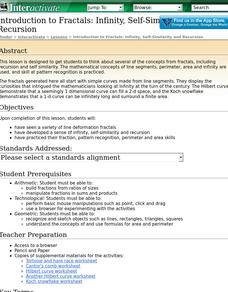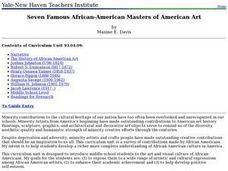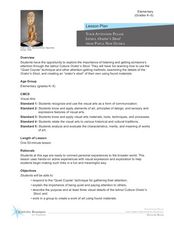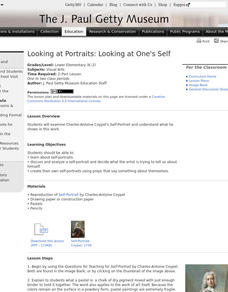Facebook
Who Do You Want to Be?
Can posting art or music online lead to the career of your dreams? Inquisitive individuals consider their social media presence with a instructional activity from a series focusing on identity exploration and digital citizenship. Pairs...
Missouri Department of Elementary
I’m Thumbody!
Positive and negative thinking is the focus of a lesson that boost self-awareness. Beginning with a whole-class discussion, scholars brainstorm what positive thinking looks and sounds like then compares and contrast the two types of...
Wordpress
Paper Doll Project
Explore self and social construction with a hands-on art project. After studying and discussing bullying and other social experiences, individuals create three paper dolls that represent specific social constructions. Included here is a...
Curated OER
Just Plain Buggy: Art and Science
Budding artists explore the shapes and parts that make insects so fascinating to study, then use what they see to create original insect inspired designs. They use wax, dye, and fabric to create their designs.
Curated OER
The Finer Things in Life
Momoyama and Edo are periods in Japanese history that can be defined culturally and artistically. Learners explore and discuss how the samurai used sword guards and grip enhancers. Pupils read the story "The Inch-High Samurai," examine...
Curated OER
Portraits in Clay: Elementary Sculpture Lesson
It is lovely how this instructional activity incorporates the importance or personal expression and art history. Children create low-fire ceramic heads that express emotion or personal feelings. The entire process is laid out...
First Stage
A Charlie Brown Christmas
Charlie Brown may not feel the Christmas spirit this year, but your elementary students can use the season to practice important cross-curricular skills! A set of worksheets and activities based on A Charlie Brown Christmas guide apply...
Curated OER
Birthday Baroque
Students draw self-portraits and birthday announcements on classroom windows. They explore the portrait painting styles of famous artists such as El Greco, Rubens, and Rembrandt. They write write in large, backward block lettering words...
Curated OER
Introduction to Fractals: Infinity, Self-Similarity and Recursion.
This lesson introduces high schoolers to the ideas involved in understanding fractals. They develop a sense of infinity, self-similarity and recursion and
Curated OER
Seven Famous African-American Masters of American Art
Students examine seven different African-American artists. In groups, they use the internet to identify their contribution and techniques to the art world and examine the time period in which the artwork was produced. To end the...
Curated OER
Me, Myself, and I
Students visually express their personalities using writing and PhotoShop. They manipulate imagery to illustrate their written description of themselves. Students display their creations.
Curated OER
Telling Stories: Symbols of a Life
Art and literature can go hand in hand, they both are used to express elements of the self in a creative and interesting way. Budding story tellers interpret and analyze the narrative elements they find in a work of art. They focus on...
Curated OER
Making a Basic Clay Animal Sculpture In-The-Round
Students create a three dimensional animal sculpture. In this sculpting instructional activity, students use white art clay, gloss glaze, brushes, and wooden tools to create an animal sculpture.
Curated OER
Your Attention Please: Iatmul Orator's Stool
Learners investigate art by observing historical sculptures from New Guinea. For this art history lesson, students observe pictures of the "Orator's Stool"from Papua New Guinea, while identifying the small details that make it unique....
Curated OER
Memory & Song, Malagan Figures from New Ireland, Papua New Guinea
Students investigate the uses of images, shapes and colors in classic art sculptures. In this art analysis lesson plan, students observe Malagan Figures, a type of sculpture from New Guinea, and describe the different ideas and images...
Curated OER
Cardboard Radial Weaving
Students explore cultural history by participating in an arts and crafts activity. In this weaving lesson, students identify the many cultures that used weaving methods and local plant life to create baskets and other useful tools....
Curated OER
Life Sized Self Portrait
Students create a self-portrait that is compiled by using individual student drawings. The drawings emphasize line, shape, color and possibly texture depending upon the student's selection of materials.
Curated OER
Brian Murphy ¿¿¿ Sleeping Self-Portrait¿¿¿
Students examine and discuss the painting, "Sleeping Self-Portrait," by Brian Murphy. They answer discussion questions, mix various paint colors, and create a self-portrait using the primary colors and white.
Curated OER
Objects as Self
Students examine how objects and setting help complete a self-portrait. They analyze Franklin's self-portraits before creating their own. They try to create the self-portrait as if they were in Franklin's time.
Curated OER
Looking at Portraits: Looking at One's Self
Students examine Charles-Antoine Coypel's Self-Portrait and explain what he shows in this work.
Curated OER
Reflection on Philanthropy and Self Concept
Students examine how philanthropy shapes one's self identity. They reflect on this topic after listening to song lyrics and create a presentation. They share the information they gathered with the class.
Curated OER
A Journey To Africa: Art And Artifacts
Students create a multimedia presentation based on a piece of African Art. They use the art piece to demonstrate the culture and ceremonies of the area in which it was produced. They research facts for a Power Point, write a poem...
Curated OER
Tootsie Roll, Tootsie Roll, Who Art Thou?
Students discuss gender role stereotyping and males and females in non-traditional work roles. They debate and discuss opinions as a group, and then as a class, concerning "men only" and "women only" jobs
Curated OER
Teaching a Second Language Through Art
Students study the names of ten colors and shades of some colors. They count to ninety-nine, examine the names of the lines and several geometric figures, and differentiate between singulars and plurals. They name the parts of the face...

























